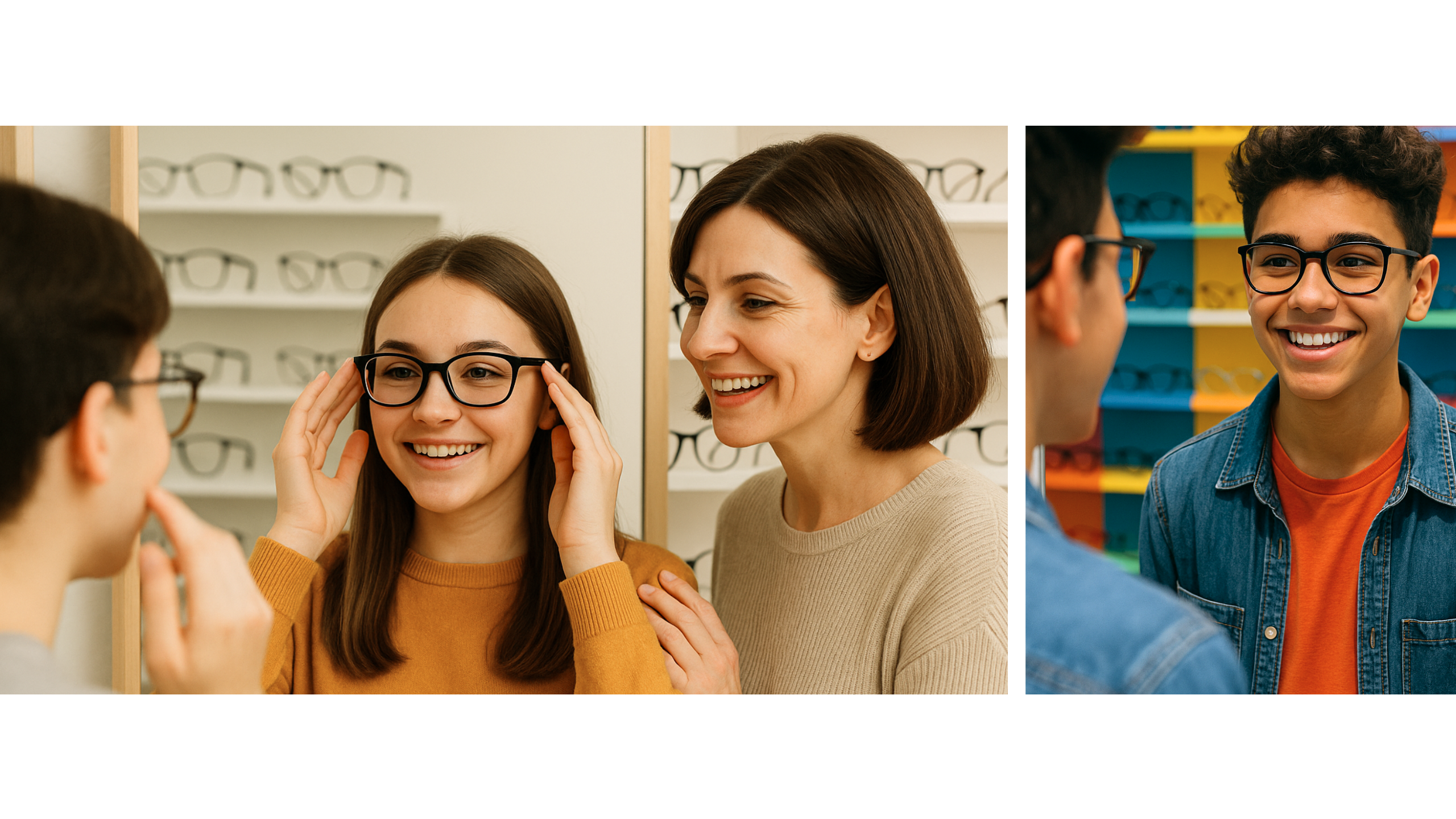More style, less embarrassment! – Glasses for teenagers can be fun!

⏱️ 02:40 READING TIME
An emotional guide for parents who really want to listen.
Adolescence is a delicate time. It’s the season when the body changes, the mind drifts away from childhood, and other people’s gaze suddenly becomes a mirror in which we search for ourselves. Amid all this, starting to wear glasses may seem like a small detail. But for a boy or girl, it’s anything but.
Some outright refuse them, others hide them in their backpack as soon as they leave school, and some wear them only when no one’s watching. Often, behind these actions lies something deeper: the fear of being seen differently, of losing beauty, spontaneity, acceptance.
It’s understandable. Wearing glasses, at a time when identity is still a mosaic under construction, can feel like an imposed frame.
But with gentleness and attentive listening, this change can become an opportunity for growth, style, and self-awareness.
Discomfort exists. And it deserves respect.
Many parents, out of affection or protective instinct, tend to downplay things: “It’s nothing,” “You look great with glasses,” “Everyone wears them nowadays.”
Sincere words, of course. But often, they don’t help.
Because what a teenager feels has nothing to do with logic. It’s gut, skin, eyes avoiding the mirror. And it needs to be acknowledged before it can be corrected.
Instead of rushing to reassure, try listening:
“What don’t you like? When do you feel most uncomfortable? Want to tell me about it?”
Sometimes, just opening a space for listening can change the direction of rejection.
The mirror doesn’t lie, but it can smile.
One of the key moments is choosing the frame.
Something magical can happen here, if handled the right way.
Walking into a shop with your child and letting them try, mess up, laugh, and change their mind is a little rite of passage. It’s like saying: “This is your choice. I’m here to support you.”
A pair of glasses can make you feel more mature, more original, more authentic. Or simply, it can help you recognize yourself. And when a teenager looks in the mirror and finally sees themselves, with those glasses on their face that seem to say “this is me”, everything changes.
Words aren’t needed. Just the smile that lights up in their eyes.
Alternatives exist (and don’t diminish the value of glasses)
At certain times — a trip, a party, a sports event, an afternoon with friends — a teenager might want to set aside their glasses, not to hide, but to feel different, free, light.
Daily contact lenses are a discreet, practical, and above all respectful solution. They offer the possibility of choice. Of saying: yes today, not today.
Not as a permanent replacement, but as an ally on days when change is desired.
For many teens, simply having an option is already a relief.

Not just beauty: glasses and style.
In the teenage world, glasses can become a signature.
A colorful frame tells a story of creativity. A minimalist model speaks of elegance. A square shape can convey strength, a round one lightness.
Helping your child find “their” glasses is like helping them find their voice in the chorus of their generation.
And there’s nothing more powerful for a teen than feeling aligned with what they feel inside and what they show on the outside.
Small gestures that change everything.
It might seem trivial, but there are things parents can do to make this phase easier. No need for long speeches. Just consistent gestures, attentive glances, and shared choices.
📍 Let them choose glasses like you’d choose shoes for a special event.
📍 Take photos with different frames, at home, calmly, away from pressure.
📍 Talk about glasses as style, not as necessity.
📍 Show them famous people, actors, athletes who wear glasses with pride.
📍 If it’s a girl starting to wear makeup, talk together about make-up for glasses wearers—not to hide the accessory but to enhance it.
📍 Let them experience glasses as something meaningful, not something imposed.
See better, feel better.
In the end, glasses help you see better. But if handled with care and heart, they can also help you feel better.
To feel seen, understood, supported.
To feel more confident reading, playing, going out, smiling.
To feel up to facing a world that looks at them—sometimes with judgment, often with admiration.
Because a teenager’s true strength… is recognizing themselves.
And yes, there will be days when those glasses get left on the nightstand. Others when they’re worn with pride. Still others when they’ll ask for contacts to feel free.
It’s all part of the journey.
We can’t expect our kids to accept everything right away.
We just have to be there—patient, present, ready to remind them that it’s not a pair of glasses that defines them.
It’s how they learn to look inside themselves.

